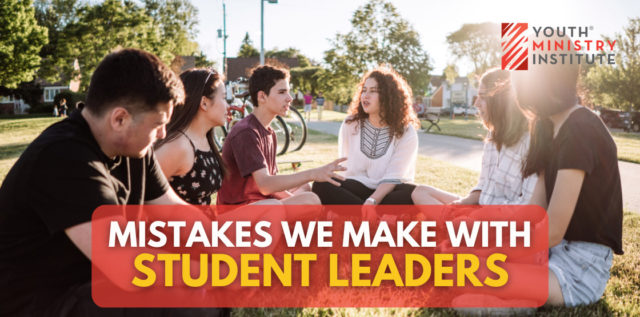Nine Christmas Party Games For Youth Or Kid’s Ministry

It’s that time of year. You’re getting ready for your Christmas party. You want it to be engaging, fun, and a time your people will remember. So, of course, you need Christmas party games.
We love Christmas – as I hope we all do! And at the Youth Ministry Institute, we are busy preparing for parties in our ministries. This got us thinking that you may be looking for games for your Christmas party.
To help you out, here is a list of a few Christmas games you want to try. So whether you work with students, children, young adults, or older adults, we think one or all of these games will work for you!
Nine Christmas Party Games
HUMAN CHRISTMAS TREE
This game is simple but can be fun and give you some great photo opportunities.
Give each group ornaments (we recommend string or yarn to help hang the ornaments), Christmas lights, garland, and a star. Each group will choose one person to be their tree. Do you have small groups? Maybe consider making the tree one of your small group leaders.
Once a person is chosen to be the tree, ask them to make their best tree pose. Give the group a time limit and let them start decorating their tree. Once time is up, give awards for things like: most original, most accurate to a Christmas tree, craziest, smelliest, scariest, and most angelic. Have fun and get creative with your categories!
HUMAN CHRISTMAS PRESENT
You play this game just like Human Christmas Tree. The only difference is that people are wrapped up like presents. Give your groups wrapping paper and other Christmas gift-wrapping items.
ICE CREAM SNOWMAN
You’ll want several tubs of vanilla ice cream in this game. You will give each team two or three scoops of ice cream (you may want to pre-scoop these and put them back in the freezer to prepare). You’ll also want baby carrots, twigs, buttons, raisins, and anything else you might want on a snowman.
When you say go, each team will create its own ice cream snowman. Unlike Olaf, these snowmen do not have Elsa’s powers to keep them from melting. The winner is the snowman that stays together the best.
SNOWBALL FIGHT OF TRUTHS
Give everyone two or three pieces of paper. Ask each person to write one fact about themselves on each piece of paper. Afterward, ask them to crumple the paper into a ball. Your group will use these papers for a three-minute snowball fight.
After all the papers are crumpled, say go and watch the madness unfold. Let them battle it out with the snowballs until three minutes have passed. Once time is up, ask them each to pick up two or three snowballs (whatever the number you had them make in the beginning). Then give each person a chance to guess who the fact is about on their snowballs.
GREAT (MINISTRY NAME) CHRISTMAS BAKE-OFF
With so many people getting into the bake-off shows, this may be perfect for your group. We recommend you break young people into teams or 2-3 or do this with your small groups. Give the groups a spending limit and encourage them to create culinary masterpieces.
Have them make their masterpieces ahead of time and bring them to your party. Let groups share their creation, inspiration, and passions for their craft. Give prizes for overall appeal, creativity, presentation, taste, and most extraordinary effort. Be sure to have judges willing to eat whatever is in front of them – because who knows what you’ll get!
ORNAMENT RACES
In this game, you will create starting and finish lines (around 12 feet apart). Gather a bulb or other spherical Christmas ornament for each group. Remove the hook and give it to each group. Next, give each group a paper plate and a straw. Have each group place their bulb at the starting line.
When you tell the groups to go, they must fan or blow the ornament across the finish line. They cannot touch the ornament with any part of their body. Consider doing this as a relay or timed match if space is an issue.
SING US A CAROL
Create a list of famous words from well-known Christmas Carols. You want easy and difficult words. Give the groups a word, such as “joy.” The first person to stand up and say (or sing) a line from a Christmas carol that uses the word joy gets the point. Want to make it more difficult? Make sure they say at least seven words from the song. And why not have them sing it with Christmas cheer for all the world to hear?
CAN YOU HEAR THAT?
Place jingle bells in boxes of different sizes. Put three bells in one box, six in another, and so on for as many boxes as you’d like. Let young people shake the boxes to guess how many bells are in the box.
CHRISTMAS SONG KARAOKE
Print up a list of Christmas songs that your group may know. Let them pick a song they know, give them a mic, and let them sing their heart out! You can look up Christmas Carol Karaoke on Youtube if you want videos with lyrics.
Final Helpful Thoughts
White Elephant Gift Exchanges
Avoid white elephant gift exchanges. I would avoid gift exchanges entirely. You never really know who will show up, and you could put an undue financial burden on a family. And my experience with the white elephant exchange has shown me that someone often gets upset (if you watch the Office, you know what I mean!)
Communicate Ahead Of Time And Often
Second, communicate ahead of time. If there is any possibility of people getting messy or needing to bring something, share that as early as possible. And you will want to communicate it as often as possible. Listen, I’m that terrible parent that won’t remember – so help us out by telling us ten times.
“Ugly Sweaters”
I know ugly Christmas sweaters can be fun. But I learned from experience that one person’s ugly sweater is another person’s favorite sweater. Thankfully I was able to apologize to the person about their favorite sweater! So be careful with your words.
Don’t Talk About Bruno
Okay, you can talk about Bruno if you want. But don’t be the one who accidentally tells a young person about Santa. It is best to stay away from the topic.
Relax And Enjoy Yourself
Finally, have fun. Enjoy yourself. You’ve probably worked hard this fall. Your young people have had long semesters at school, and your volunteers have given a lot. Don’t be over-spiritual. Let everyone enjoy being together. And don’t forget to show appreciation to your volunteers – give them a mug, cool socks, or a gift card to their favorite place.

Rev. Brian Lawson is the Director of Leadership Development and Client Services for YMI and has served in youth ministry since 2004. He also serves as a pastor in the Florida Conference of the UMC. Brian holds a Master of Ministry with a focus in organizational culture, team-based leadership, change, conflict, and peacemaking from Warner University. In addition to his degrees from Warner, he studied Christian Education at Asbury Theological Seminary. Click the social links below to engage with Brian.

















